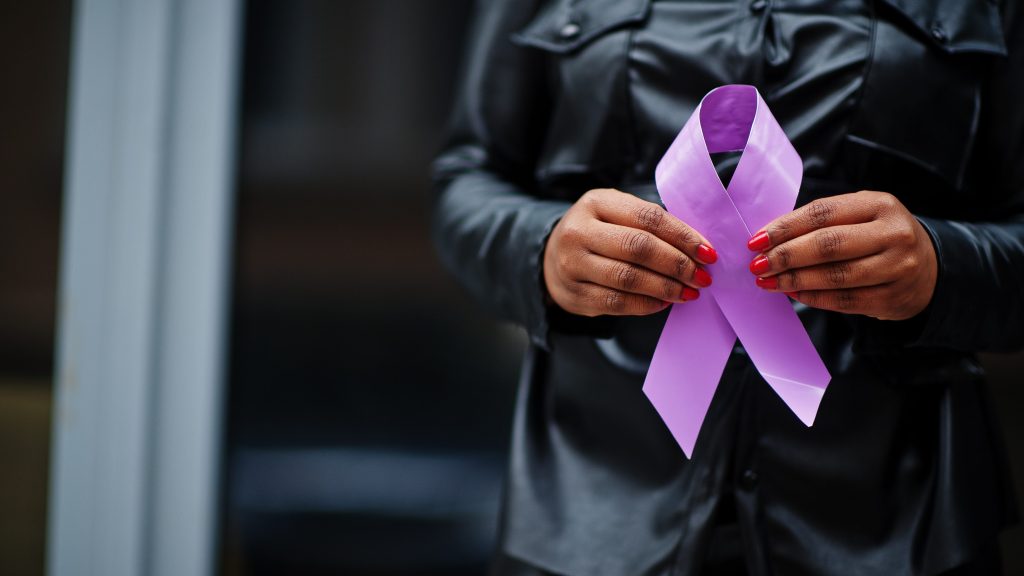Keke Palmer’s allegations of intimate partner violence highlight 12 relationship red flags
Here are some early signs of intimate partner violence —and expert advice on what to do about it.
Last week, actress Keke Palmer filed for and was awarded a temporary restraining order against her ex, Darius Jackson. Palmer alleges she experienced intimate partner violence, including physical, verbal, and emotional — claims Jackson has denied.
The developing story underscores the importance of knowing the signs of intimate partner violence, especially for Black women who are disproportionately impacted.
In this country, roughly 45% of Black women and 40% of Black men are projected to experience intimate partner violence over the course of their lives. Other stats average that Black women are at least 2.5 times more likely to experience violence at the hands of a partner than white women. Socioeconomic status is less of a factor; intimate partner violence impacts both men and women across different walks of life and social standings.

As intimate partner violence is thrust into the spotlight once again, Karma Cottman, who serves as CEO for Ujima Inc., The National Center on Violence Against Women in the Black Community, sat down with theGrio to discuss its prevalence in the Black community, how to recognize the signs, and what to do if you or someone you know is currently experiencing intimate partner violence.
The Centers for Disease Control defines intimate partner violence as aggression or abuse occurring in a romantic partnership, including physical, sexual, stalking, and psychological abuse.
Cottman said intimate partner violence is still defined “through the lens of power and control.” She also noted it has come to include far more than just physical since the advent of technology.
As for why Black women are impacted at disproportionate rates, Cottman noted that, due to systemic reasons, Black men, the largest perpetrators of violence against Black women (as most intimate partner violence is intraracial), might be dealing with violence in many forms themselves.
While national organizations aimed at combating domestic violence began cropping up roughly 40 years ago, Cottman noted that many of those programs failed to fully meet the needs of Black women, and many still fail to. She added that, additionally, society has felt as though something like intimate partner violence can’t happen to Black women.
“Our strength as Black women is oftentimes used against us,” Cottman said.
While pervasive, intimate partner violence is preventable. Much of the time, it can also be spotted well before it escalates. Cottman said abusers rarely show up as abusive at first, but over time, certain “alarm bells” may start going off.
“We have incredible instincts,” Cottman said. “Sometimes in relationships, we second guess. So, the first thing to do is to give yourself grace to follow your instincts. If you’re questioning how a person is making you feel just internally, if you’re questioning that, then listen to it.”
Below, we’ve compiled a list of 12 common red flags to watch out for in relationships and offer some strategies for seeking help for yourself or others.
1. Too good to be true at the onset
Cottman said many victims of domestic violence describe a very similar start to their relationship dynamics: their partner seemed “too good to be true” at first. When someone is overly charming and agreeable, somehow into everything you’re into, and piles on the praise and compliments, they could be masking a darker personality.
2. Moving too quickly or forcing a relationship
Being pressured to move too quickly in a relationship could look like one partner saying “I love you” too soon, known as “love bombing.” It can also look like a partner pushing the other to reach certain relationship milestones before they’re ready, including intimacy, staying over, or establishing a label. For many, this is a red flag because being pressured into doing anything outside of your comfort zone is a sign a partner may struggle to respect boundaries.
3. Jealous, possessive, or controlling behavior
Jealousy is a normal human emotion most people will experience occasionally. However, it can become abusive when it is constant, leading to rageful lashing out and other controlling or possessive behavior, like controlling what you wear and who you see. Jealousy can be rooted in insecurity and thus rarely has anything to do with what the other person is or isn’t doing.
Cottman said this happens when “They’re projecting all of their fears, all of their concerns, all of their control onto their partner and making them feel as if they’re doing everything wrong.”
4. Misogyny or other problematic opinions
Everyone is entitled to their own opinion. However, when our opinions result in or perpetuate the harm of others, we have to interrogate them. A partner who holds opinions that are controversial (or downright harmful) to you, your loved ones, and your friends may ultimately not value your humanity as a partner should.
5. Cuts off communication
Ignoring someone, especially amidst a disagreement, is not only childish; it’s setting the stage for more controlling behavior. If a partner cuts off communication to (ironically) communicate they are upset or shuts down in the middle of disagreements, they could, over time, become harder and harder to resolve issues with.
6. Dishonesty
The expression goes, “If you lie, you will steal. If you steal, you will kill,” for a reason. Whether it’s a half-truth or a whole lie, dishonesty is a control tactic. When someone is dishonest or withholds information, they are attempting to control the situation.
7. Yelling, cursing, and name-calling
Being yelled at can be triggering for many people. It’s an aggressive act typically reserved for extreme situations like being in danger. It’s also not an effective or respectful way to communicate with a partner, as it can cause one to feel under attack and go into fight-or-flight mode. Using expletives or deliberately name-calling demonstrates disrespect and an overall lack of consideration for the other person’s feelings.
8. Overly critical or puts you down
Ideally, your partner should genuinely believe the sun shines out of your you-know-what. Anything less than that, and it should be a resounding “thank you, next.” Nobody is perfect or above criticism; however, a partner who is overly critical of you or puts you down – whether teasingly or not – is demonstrating a lack of care for your feelings and a lack of respect for you.
Cottman also said when a person is being overly critical, “They’re escalating that level of power, they’re escalating that level of control.”
9. Sabotage or “petty punishments”
They force you to run late for work by leaving you stranded without your car. They behave in a way that forces you to behave out of your character in public. They offer their help with something and then renege at the last minute because “they’re mad.” All of these scenarios are examples of how a partner can attempt to sabotage you or unleash “petty punishments” when upset or attempting to get their way. Anyone who would deliberately harm you, even by causing you to run late, is demonstrating a huge red flag for dealing with issues in relationships.
10. All of their exes are “crazy”
They have a laundry list of exes — and yet, somehow, they are never the problem. This person either has bad taste or is failing to realize they are the common denominator. If people describe how a relationship ended without stating their responsibility in the situation, they may have trouble accepting accountability, a bad trait that can get very out of hand very quickly.
11. They distance you from friends and family
Whether your friends and family have voiced they don’t like your partner or your partner has voiced they don’t like them, it’s never a good sign. Pay attention not just to whether your partner is attempting to isolate you but if they are repelling your friends and family. If your partner encourages you to push your friends and family away, or you feel uncomfortable around your friends and family because of your relationship, consider the fact that that is unhealthy.
“Generally, once you get to a point of someone saying, ‘You can’t have any friends’, or ‘I don’t want you to see your family,’ they’ve already started planting other things,” Cottman said.
12. Physically harms you, themselves, or others, or threatens to
Cottman said when a partner threatens to harm themselves as a retaliatory tactic, “those are very serious red flags.”
“We see that as the emotional abuse continues to build, and then it can move and escalate into physical violence,” she said.
Whether they physically strike you or not, if a partner ever makes you feel unsafe, please know it is never acceptable. If someone puts their hands on you or threatens to harm themselves or others, please know violence is never the answer. There is never an excuse for intentional harm.
What to do about red flags?
If you encounter any red flags during a relationship, address them right away. At the first instance, establish boundaries, communicate needs, and ultimately assess if the relationship is healthy or toxic.
“Really paying attention to those warning signs is important,” Cottman stressed.
The next step is to get help. Organizations like Ujima have a wealth of resources available. Cottman said a lot of hotlines are anonymous, “So you can reach out and just talk to someone. Share what you’re experiencing, and find out where there are local resources in your community,” without the threat of anyone finding out.
While noting that “the isolation is real,” as a next step, Cottman advises potential survivors, “Let your family and friends know what’s going on.”
If someone approaches you about their relationship dynamic, she advises navigating the conversation without judgment.
“Sometimes it’s important for us to listen without judgment, listen without saying what we would do in that situation because we don’t know,” she said.
Lastly, Cottman reminds anyone dealing with intimate partner violence, or anyone who has in the past, to know “you are not alone.”
If you or someone you know is experiencing domestic violence, help is available 24/7 by calling the National Domestic Violence Hotline at 1-800-799-7233, or go to thehotline.org. All calls are toll-free and confidential.
Kay Wicker is a lifestyle writer for theGrio covering health, wellness, travel, beauty, fashion, and the myriad ways Black people live and enjoy their lives. She has previously created content for magazines, newspapers, and digital brands.
Never miss a beat: Get our daily stories straight to your inbox with theGrio’s newsletter.


